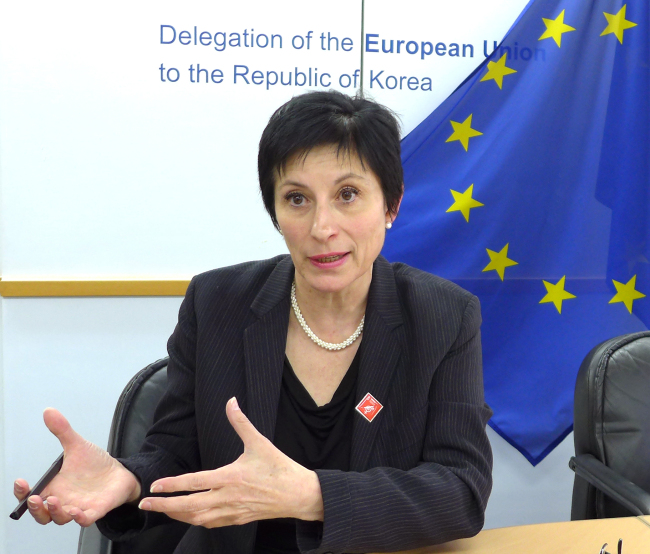EU shares pains, gains in combating gender violence
It’s about fostering a culture of respecting and interacting, based on the notion that violence and discrimination stem from “wrong” values and attitudes.
By Korea HeraldPublished : March 20, 2017 - 17:41
The European Union Agency for Fundamental Rights released the results of a survey on gender-based violence across its 28 member states in March 2014, after interviewing 42,000 women.
“The results were shocking,” according to Dr. Joelle Hivonnet, minister counsellor at the EU Delegation to Korea. One in 3 women, numbering 60 million, reported experiencing either sexual or physical violence or both. One in 5 admitted being stalked online. One in 20 claimed that they were raped.
Despite being the standard bearer of human rights and democracy, the EU, much like elsewhere, faces similar problems in gender-related misdeeds, the France-born diplomat told The Korea Herald last week. “Violence against women happens everywhere, at home, on the streets and in the workplace.”
Hivonnet has participated in many projects and policy-making initiatives at the EU geared toward enhancing gender equality and human rights over the last 25 years.
“The results were shocking,” according to Dr. Joelle Hivonnet, minister counsellor at the EU Delegation to Korea. One in 3 women, numbering 60 million, reported experiencing either sexual or physical violence or both. One in 5 admitted being stalked online. One in 20 claimed that they were raped.
Despite being the standard bearer of human rights and democracy, the EU, much like elsewhere, faces similar problems in gender-related misdeeds, the France-born diplomat told The Korea Herald last week. “Violence against women happens everywhere, at home, on the streets and in the workplace.”
Hivonnet has participated in many projects and policy-making initiatives at the EU geared toward enhancing gender equality and human rights over the last 25 years.

In Europe, education focuses on the role of both men and women, she explained, adding men are encouraged to be more honest with their feelings, such as crying when they feel sad, and discouraged to using force in achieving their goals. It’s about fostering a culture of respecting and interacting, based on the notion that violence and discrimination stem from “wrong” values and attitudes, the delegation’s second-in-rank said.
“We have to use every single tool at our disposal, including legal ones for criminalizing more severe cases of violence and rights breaches,” she added. “But if we want to get to the bottom of the problems fundamentally, we have to look at the cultural dimension and pay more attention to men.”
To mark International Women’s Day on March 8, the EU delegation, in partnership with Korea’s Ministry of Gender Equality and Family, Korea Institute of Gender Equality Promotion and Education and Korea Communications Standards Commission, held a workshop on online-based gender violence on Wednesday.
Four European experts -- Liesbet Stevens, deputy director at the Federal Institute for Equality of Women and Men in Belgium; Jackie Jones, professor of feminist legal studies at the Bristol Law School in the United Kingdom; Hanna Onwen-Huma, development manager at the National Institute for Welfare and Health in Finland; and Carl Miller, research director at the Center for Analysis of Social Media at the Demos think tank in the UK -- shared Europe’s challenges and policy successes.
According to the scholar-turned-diplomat, the spread of internet and social media has exacerbated and broadened the problem, as sexist, racist and xenophobic perceptions are incited across “echo chambers” online and inspire physical violence. Citing cyberstalking and revenge pornography, Hivonnet said “the intersection between online and offline-based violence is explosive,” explaining they share same root causes.
In France, the rise of ultra-right nationalist and religiously conservative groups has converged with xenophobia, homophobia and sexism, driven by social and economic inequalities, she explained. “What’s also ironically interesting is that Europe’s ultraconservatives are joining forces across national borders despite their jingoist causes.”
2017 has been designated the European year for ending violence against women. The supranational body has devised ways to address issues comprehensively through national legislations, awareness-raising campaigns, $4.3 million in funding for civic organizations and educational institutions, as well as humanitarian projects for victims in post-conflict areas and isolated communities.
In particular, the European Commission will implement a series of measures to ensure that in all member states, various actions involving local governments, civil societies, schools and media are taken to root out online and offline transgressions.
By Joel Lee (joel@heraldcorp.com)
-
Articles by Korea Herald


![[Exclusive] Korean military set to ban iPhones over 'security' concerns](http://res.heraldm.com/phpwas/restmb_idxmake.php?idx=644&simg=/content/image/2024/04/23/20240423050599_0.jpg&u=20240423183955)




![[Pressure points] Leggings in public: Fashion statement or social faux pas?](http://res.heraldm.com/phpwas/restmb_idxmake.php?idx=644&simg=/content/image/2024/04/23/20240423050669_0.jpg&u=)











